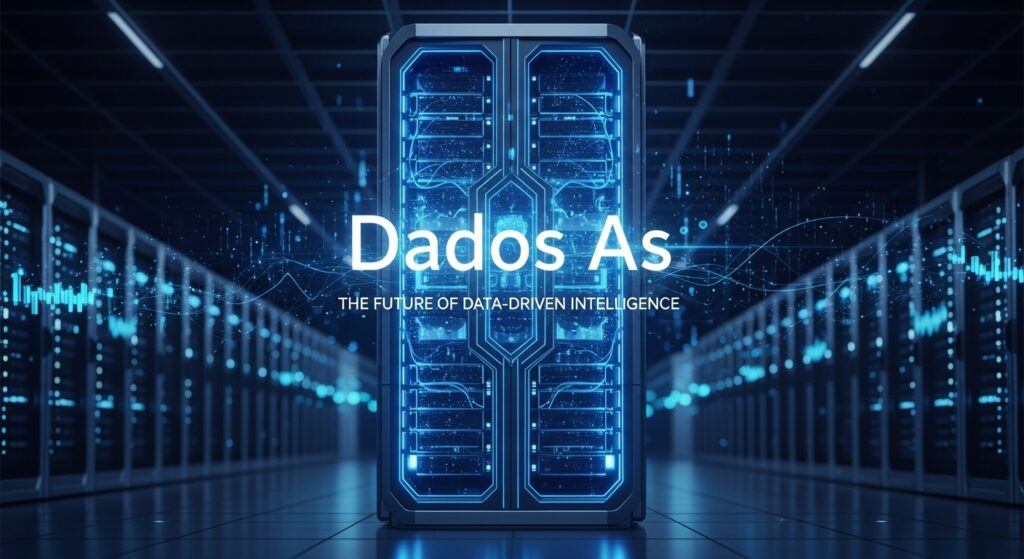In today’s digital economy, data is the foundation of every business decision. The term dados as has become a symbol of transformation, efficiency, and analytical intelligence. From startups to global corporations, everyone depends on the power of dados as to understand patterns, predict trends, and make accurate choices that drive growth and innovation.
Understanding the Concept of Dados As
The phrase dados as comes from the Portuguese word “dados,” meaning “data.” It represents a framework or service model where data is treated as a central asset, similar to how “Software as a Service (SaaS)” or “Infrastructure as a Service (IaaS)” functions. In simple terms, refers to Data as a Service (DaaS) — a system that allows organizations to access, store, and analyze data remotely through the cloud.
Businesses no longer need to invest heavily in physical databases or complex infrastructure. Instead, they can use dados as solutions to collect, clean, and process massive data sets efficiently and securely.
The Role of Dados As in Modern Business Ecosystems
The role of dados as extends far beyond simple data storage. It integrates advanced analytics, artificial intelligence (AI), and machine learning (ML) to convert raw data into actionable insights. Companies use to streamline marketing strategies, enhance customer experiences, and predict future market behaviors.
| Function | Description | Business Impact |
|---|---|---|
| Data Integration | Combining data from multiple sources | Provides a unified business view |
| Data Analytics | Applying AI and ML algorithms | Enables real-time insights |
| Data Visualization | Creating dashboards and reports | Improves decision-making efficiency |
| Data Governance | Managing privacy and compliance | Ensures data accuracy and trust |
The table above highlights how contributes to a data-driven business ecosystem where accuracy, accessibility, and agility are key advantages.
Evolution of Dados As Technology
The evolution of dados as is linked closely to the rise of cloud computing. In earlier years, businesses relied on on-premises data servers. However, the limitations of scalability and maintenance costs led to the birth of cloud-based models.
Now, dados as enables companies to rent data services on demand, reducing the need for in-house IT management. The flexibility of empowers businesses to focus more on analysis rather than infrastructure, which helps them grow faster while maintaining cost efficiency.
How Dados As Works
The dados as model functions through cloud-based platforms that offer various data services, including storage, processing, and analytics. These platforms use APIs (Application Programming Interfaces) to allow users to extract or input data seamlessly from any location.
| Component | Purpose | Example |
|---|---|---|
| Data Source | Origin of data such as sensors, apps, or CRMs | IoT devices, websites |
| Data Pipeline | Transfers and transforms raw data | ETL (Extract, Transform, Load) tools |
| Cloud Storage | Centralized repository for data | AWS, Google Cloud, Azure |
| Analytics Engine | Performs complex computations | BigQuery, Databricks |
| Visualization Tool | Presents data in visual formats | Power BI, Tableau |
This table explains the key components that work together in solutions. The entire process ensures that users can easily manage and interpret large data sets.
Benefits of Adopting Dados As Solutions
Organizations implementing benefit in multiple ways. The technology enhances data accessibility, improves collaboration, and reduces the time spent on manual tasks. Some of the major benefits include:
-
Scalability: Dados as allows organizations to scale their data usage up or down based on needs.
-
Cost Reduction: No expensive hardware or maintenance is required.
-
Accessibility: Teams across different regions can access the same data source in real-time.
-
Enhanced Decision Making: Data insights can be generated instantly through AI and analytics.
-
Security: Most providers use end-to-end encryption and compliance protocols to safeguard data.
These benefits make dados as a cornerstone for any digital transformation strategy.
Dados As vs Traditional Data Management
To understand the difference between traditional methods and dados as, it’s important to compare both approaches.
| Feature | Traditional Data Management | Dados As |
|---|---|---|
| Infrastructure | On-premises servers | Cloud-based |
| Cost | High initial investment | Pay-as-you-go |
| Maintenance | Requires in-house staff | Managed by service providers |
| Scalability | Limited | Highly scalable |
| Data Access | Restricted to location | Global access via the internet |
As shown in the table, provides significant advantages in terms of cost-efficiency, scalability, and global accessibility — making it the preferred choice for modern enterprises.
Real-World Applications of Dados As
The dados as model is now used across multiple industries due to its flexibility and efficiency. In healthcare, helps manage patient data securely. In finance, it aids in risk assessment and fraud detection. Retail businesses use for customer segmentation and personalized marketing, while manufacturing companies apply it for predictive maintenance and process optimization.
These real-world examples illustrate the versatility of and its growing influence on global industries.
Security and Compliance in Dados As
Security remains a top concern for organizations adopting dados as solutions. Providers use advanced encryption methods, identity management, and multi-factor authentication to ensure that sensitive data is protected.
Furthermore, platforms comply with global data protection regulations like GDPR, CCPA, and HIPAA, providing organizations with confidence that their information remains secure and compliant.
Integrating Dados As with Artificial Intelligence
One of the most promising aspects of dados as is its integration with AI technologies. Artificial Intelligence algorithms analyze large data sets to reveal hidden trends and patterns. By combining with AI, organizations can achieve predictive analytics, automated decision-making, and real-time monitoring of operations.
For example, an e-commerce company can use to analyze customer purchasing behavior, then apply AI models to predict what products might be in demand next month.
Future of Dados As in the Digital Landscape
The future of dados as looks incredibly bright as the global demand for data-driven solutions continues to rise. With emerging technologies like 5G, edge computing, and quantum analytics, platforms will evolve to provide faster and more accurate results.
Businesses will increasingly adopt hybrid cloud models, where integrates with both public and private clouds for enhanced flexibility. This future points toward a data-driven world where companies can rely entirely on frameworks for operational success.
Challenges Faced in Dados As Implementation
Despite its benefits, dados as comes with its own set of challenges. Issues such as data privacy, integration complexity, and vendor lock-in may affect organizations that are new to the model.
To overcome these issues, companies must carefully choose providers with transparent pricing, strong compliance frameworks, and proven reliability. Additionally, proper employee training ensures smooth adoption and maximum utilization of services.
Why Is Essential for Digital Transformation
Digital transformation depends heavily on how businesses manage and interpret their data. Dados as empowers companies to transform their data management processes from static to dynamic. By enabling real-time analytics and faster decision-making, bridges the gap between data and strategy.
This approach not only saves costs but also builds a culture of innovation, where data becomes the driving force behind every business choice.
Comparing Top Dados As Providers
To understand the growing competition in the dados as market, let’s look at a few key players.
| Provider | Specialty | Unique Feature |
|---|---|---|
| AWS Data Exchange | Comprehensive cloud integration | Wide marketplace access |
| Microsoft Azure Data Share | Enterprise-level collaboration | Advanced security management |
| Google BigQuery | Fast query processing | Seamless scalability |
| Snowflake | Cloud-native architecture | Multi-cloud support |
These leading providers continue to shape the landscape by offering flexible, secure, and high-performance platforms that cater to various business needs.
Conclusion
In conclusion, dados as represents a revolutionary step in how the world handles data. By treating data as a service, organizations can move faster, operate smarter, and adapt more effectively to the ever-changing digital environment.
As we move deeper into the age of automation and artificial intelligence, will remain at the heart of innovation. Businesses that embrace this technology early will enjoy a competitive advantage, gaining insights that lead to growth, efficiency, and sustainability.
FAQs
What does dados as mean?
Dados as refers to “Data as a Service,” a cloud-based model for managing, storing, and analyzing data efficiently.
How does improve business performance?
It provides instant access to data analytics tools, enabling companies to make faster and more accurate decisions.
Is dados as secure?
Yes, platforms use encryption, authentication, and compliance frameworks to ensure data privacy and protection.
Can small businesses use dados?
Absolutely. is scalable and cost-effective, making it suitable for both startups and large corporations.
What is the future of dados as?
Dados will continue to evolve with AI, edge computing, and machine learning, creating a more intelligent and connected digital ecosystem.






